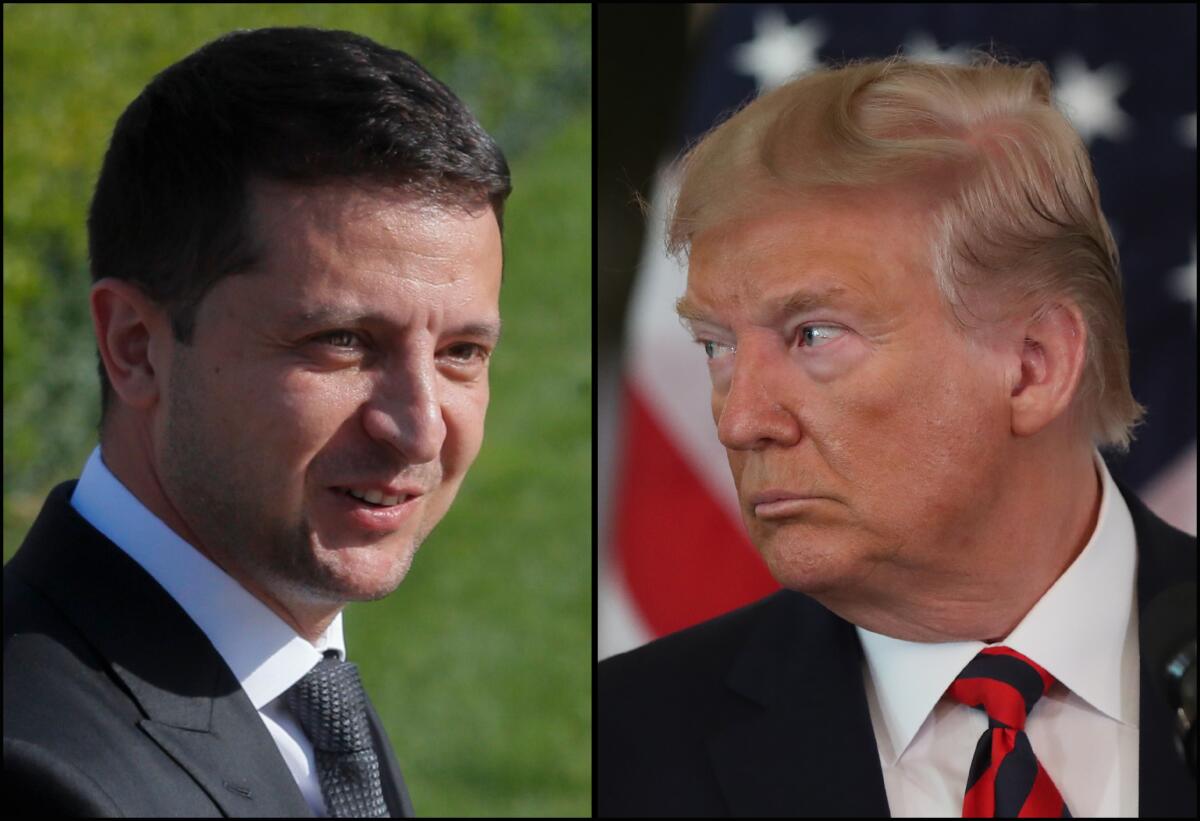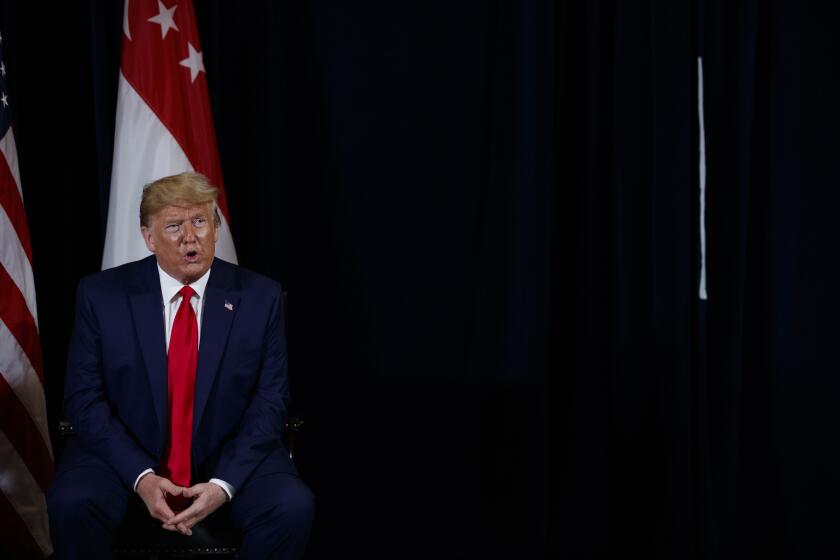How Ukraine found itself at the heart of an intensifying Trump scandal

- Share via
Suddenly, Ukraine is ubiquitous.
The former Soviet republic, Europe’s second largest country in terms of land area, finds itself thrust into an unwelcome spotlight over President Trump’s alleged attempts to pressure its new government into digging up dirt on his potential rival in 2020, former Vice President Joe Biden.
Ukraine, with a population of about 45 million, is no stranger to superpower geopolitics. It sits next door to Russia, which seized a chunk of its territory five years ago and has continued to back a separatist uprising.
And it’s not the first time Ukraine has become embroiled in U.S. presidential politics. Trump’s former campaign manager, Paul Manafort, was imprisoned for engaging in illegal lobbying in Ukraine for about a decade beginning in 2004 and hiding the proceeds.
Ukraine’s president, Volodymyr Zelensky, a former comedian who once played his country’s president on TV, was elected in May in a landslide. The 41-year-old political neophyte campaigned on an anti-corruption platform, and during his four months in office, he has sought to defuse tensions with Moscow while continuing to build ties with the United States in hopes it would be a bulwark against Russian aggression.
Candidates call for impeachment proceedings against President Trump, who says he held up aid to Ukraine before urging its leader to investigate Joe Biden.
Zelensky is scheduled to meet with Trump on Wednesday at the United Nations, an encounter that’s been supercharged by the burgeoning controversy over a July 25 phone conversation that was flagged by a whistleblower from the U.S. intelligence community. That complaint is now at the center of a decision Tuesday by House Speaker Nancy Pelosi to launch impeachment proceedings against Trump.
Here’s a look at how the Ukraine story became a U.S. political scandal, and what’s at stake.
How did all this get started?
The whistleblower filed a formal complaint last month after seeing or hearing something that sparked alarm. Multiple news accounts have since pinpointed the call between Trump and Zelensky. The intelligence community’s inspector general deemed the concern an urgent and credible threat to national security. By law, that means the complaint is supposed to be turned over to Congress within a week, but the inspector general’s boss, acting Director of National Intelligence Joseph Maguire, has refused to do so. Maguire is to appear before Congress on Thursday, and the whistleblower report has been subpoenaed. Pelosi has told him to bring the report when he comes to testify before the House Intelligence Committee.
What exactly transpired when Trump and Zelensky talked?
We don’t really know. After a report in the Wall Street Journal said Trump pressured Zelensky eight times to investigate Biden’s son Hunter, Trump acknowledged that the two talked about Biden and corruption. The president also acknowledged that he had ordered military aid to Ukraine to be withheld, but he said that was meant to pressure Europe to provide more aid and had nothing to do with coercing the Ukrainian government to open an investigation of the Bidens. Trump has repeatedly referred to his phone call with Zelensky as “perfect” and said — most recently in a series of heated exchanges with reporters at the U.N. on Tuesday — that he has done nothing wrong.
What exactly was the Bidens’ involvement in Ukraine?
Trump and his allies, including his personal lawyer, Rudolph W. Giuliani, have accused Biden and his son Hunter of corruption but offered no evidence. Hunter Biden served for almost five years on the board of Burisma Holdings, a Ukrainian natural gas company. The company’s owner was investigated by Ukrainian prosecutors at one point over possible financial abuses, but Hunter Biden was not accused of any wrongdoing. Trump and his backers have accused Biden, then serving as vice president, of putting pressure on Ukraine three years ago to fire its top prosecutor, Viktor Shokin, in order to shield his son. Biden did urge Shokin’s ouster, but in concert with other key Western officials who were upset that other corruption cases were not being pursued. And the Burisma inquiry was reported to have been already dormant at that time.
How big a problem is corruption in Ukraine?
Corruption has been a major concern since Ukraine gained independence with the 1991 breakup of the Soviet Union. After pro-Russia President Viktor Yanukovich was ousted in a 2014 revolution, successive U.S. administrations — under President Obama and then Trump — poured millions of dollars of aid into Ukraine, much of it aimed at helping shore up Ukrainian forces. But all international partners, including the World Bank, European governments and the International Monetary Fund, were worried about rampant corruption, which was why Obama assigned Biden to be the point man on the issue. Because his son was doing business in Ukraine, that prompted questions at the time about a potential conflict of interest. But Biden pointed to his son’s status as a private citizen and said he made his own business decisions.
Is Zelensky caught between Moscow and Washington?
To a point, yes. Russia was punished with sanctions for its annexation of Ukraine’s Crimean peninsula, but eastern Ukraine remains an active battlefront. The separatist conflict that broke out in 2014 has killed more than 13,000 people, and Russian President Vladimir Putin, for all his nationalist saber-rattling, feels some economic pressure to get out from under Western sanctions. Since taking office, Zelensky has made efforts to reach out to Moscow, even while holding firm in rejecting Russia’s annexation of Crimea. The new Ukrainian leader has said little publicly about Ukraine’s wish to eventually join the North Atlantic Treaty Organization, a tinderbox issue for the Russian government. Over the summer, Zelensky helped engineer a prisoner exchange, the largest of its kind in years. And this month, French and German officials took part in talks with counterparts in Ukraine and Russia to bat around ideas for peace talks.
What has been Moscow’s response to all this?
Basically to sit back and enjoy the spectacle. As the scandal has escalated in recent days, Russian state television has repeatedly made mocking references to it. But there are much more serious concerns about whether Trump’s dealings with Ukraine might ultimately have put Western interests at risk and — once again — helped Putin achieve longtime goals of sowing instability and confusion in order to undermine long-standing U.S. alliances. At the recent Group of 7 summit in France, Trump stood alone among the members of the club of richest democracies with his appeals to reinstate Russia, which was kicked out of what used to be the Group of 8 over its moves in Ukraine. Trump said it was time to move on.
More to Read
Sign up for Essential California
The most important California stories and recommendations in your inbox every morning.
You may occasionally receive promotional content from the Los Angeles Times.














